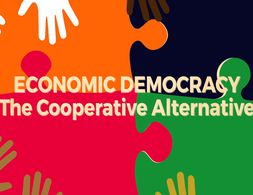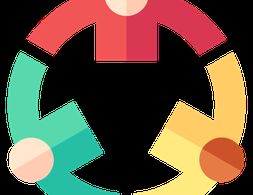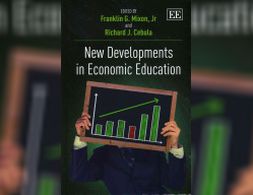✕
299 results
The first day of the workshop is intended to initiate students to the foundational concepts of ecological economics. Ecological economics is an ecological critique of economics, applying the energetics of life to the study of the economy. It also investigates the social distribution of environmental costs and benefits. It does so by deconstructing concepts that are taken for granted like “nature” or “the economy”, excavating their ideological origins.
Is capitalism the context where gender inequalities are reproduced, or is capitalism something more than a context? What are the differences among women and how can we place them theoretically and politically. Reproductive work, is it a women’s work? These questions are disscused in a three-session workshop.
This self-paced free course by Perry Merhling guides you to his "Money View" approach that integrates the fields of economics and finance. The course can easily be understood by people interested people without technical economic knowledge or training as it is primarily a tool for analysis.
The workshop deals with the contribution of Plural Economics to the urgently needed change of the economic system towards sustainability and global responsibility.
After completing the module, participants should be able to demarcate and explain different economic approaches to sustainability. They should be able to evaluate the respective concepts based on their contribution to the ecological transformation of the economic system.
Photo by Anne Nygård on Unsplash In this course you will learn all of the major principles of microeconomics normally taught in a quarter or semester course to college undergraduates or MBA students Perhaps more importantly you will also learn how to apply these principles to a wide variety of …
Understanding the financial crisis from four very different economic theories: Social Economics, Institutional Economics, Post Keynesian economics.
Identify the historical and cultural systems driving globalization and changing societies around the world.
How can we get people to save more money eat healthy foods engage in healthy behaviors and make better choices in general There has been a lot written about the fact that human beings do not process information and make decisions in an optimal fashion This course builds on much …
"Could a cooperative market economy, in which firms are owned and controlled by their workers, be a viable and efficient alternative to capitalism?"
Information and skills required to make more sustainable choices every day.
This MOOC (Massive Open Online Course) discusses Global Workers’ Rights and shows instruments and strategies which can be used to implement them.
From religious leaders to heads of state, everyone is talking about economic inequality. What form can such inequality take in different countries? What impact does it have on society? And why should it matter to you?
A free online course at Masters-level will enable you to understand the past, present and future role of money in society.
This course seeks to interpret capitalism using ideas from biological evolution. The lectures are foundational on neoclassical economics and economist, as well as their roles in the proliferation of capitalist ideology. However, it is less concerned with the ultimate judgment of capitalism than with the ways it can be shaped to fit more specific objectives.
This course provides a simple introduction to problems that social scientists are working on (e.g. racial disparities, inequality and climate change) in a manner that does not require any prior background in Economics or Statistics.
A short course introducing co-operative firms, in the context of the Candian economy where various forms of co-operative make up a significant sector of the economy. The course offers foundational knowledge about co-operatives, explaining what they are and how they operate.
Neoliberalism is dead. Again. After the election of Trump and the victory of Brexit in 2016, many diagnosed the demise of the ideology of Margaret Thatcher, Ronald Reagan, Augusto Pinochet, and the WTO. Yet the philosophy of the free market and the strong state has an uncanny capacity to survive and even thrive in crisis.
Why is money more valuable than the paper on which it is printed Monetarists link the value of money to its supply and demand believing the latter depends on the total value of the commodities it circulates According to Prabhat Patnaik this logic is flawed In his view in any …
Trade disputes are usually understood as conflicts between countries with competing national interests, but as Matthew C. Klein and Michael Pettis show in this book, they are often the unexpected result of domestic political choices to serve the interests of the rich at the expense of workers and ordinary retirees.
The Wealth of Ideas traces the history of economic thought, from its prehistory (the Bible, Classical antiquity) to the present day.
This book is about history of monetary economic thought. From the 18th century with Hume and Smith to the early 20th, the author explains the different schools of thought regarding the monetary theories and policies and specially the central banking theory.
How did the industrialized nations of North America and Europe come to be seen as the appropriate models for post-World War II societies in Asia, Africa, and Latin America? How did the postwar discourse on development actually create the so-called Third World? And what will happen when development ideology collapses? To answer these questions, Arturo Escobar shows how development policies became mechanisms of control that were just as pervasive and effective as their colonial counterparts.
Mainstream economics was founded on many strong assumptions. Institutions and politics were treated as irrelevant, government as exogenous, social norms as epiphenomena. As an initial gambit this was fine. But as the horizons of economic inquiry have broadened, these assumptions have becomehindrances rather than aids.
In a capitalist system, consumers, investors, and corporations orient their activities toward a future that contains opportunities and risks. How actors assess uncertainty is a problem that economists have tried to solve through general equilibrium and rational expectations theory. Powerful as these analytical tools are, they underestimate the future's unknowability by assuming that markets, in the aggregate, correctly forecast what is to come.
This book introduces 40 critical pointers for those who wish to see the theory in a broader, more realistic context. The material is suitable for introductory and intermediate courses and can be included selectively by students for additional reading or in lectures or tutorials as discussion points. "Students of mainstream economics need a guide like this to help them understand the underlying assumptions, limitations and inbuilt biases of what they are studying. It helps them open their eyes to a broader view of how real economies work."
The Austrian School of Economics is an intellectual tradition in economics and political economy dating back to Carl Menger in the late-19th century. Menger stressed the subjective nature of value in the individual decision calculus. Individual choices are indeed made on the margin, but the evaluations of rank ordering of ends sought in the act of choice are subjective to individual chooser.
Geographical economics starts from the observation that economic activity is clearly not randomly distributed across space. This revised and updated introduction to geographical economics uses the modern tools of economic theory to explain the who, why and where of the location of economic activity. The text provides an integrated, first-principles introduction to geographical economics for advanced undergraduate students and first-year graduate students, and has been thoroughly revised and updated to reflect important developments in the field, including new chapters on alternative core models and policy implications.
The current global financial system may not withstand the next global financial crisis. In order to promote the resilience and stability of our global financial system against future shocks and crises, a fundamental reconceptualisation of financial regulation is necessary. This reconceptualisation must begin with a deep understanding of how today's financial markets, regulatory initiatives and laws operate and interact at the global level.
Taking as its starting point the interdependence of the economy and the natural environment, this book provides a comprehensive introduction to the emerging field of ecological economics.
This book presents recent thought on market efficiency, using a complex systems approach to move past equilibrium models and quantify the actual efficiency of markets.
This innovative book offers targeted strategies for effectively and efficiently teaching economics at both undergraduate and postgraduate levels. It provides professors and other teachers of economics various techniques to engage and retain the interest of students, and challenges them to apply both knowledge and methodological tools to a range of economic problems.
Are humans at their core seekers of their own pleasure or cooperative members of society? Paradoxically, they are both. Pleasure-seeking can take place only within the context of what works within a defined community, and central to any community are the evolved codes and principles guiding appropriate behavior, or morality.
We use cookies on our website. Click on Accept to help us to make Exploring Economics constantly better!

























